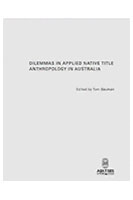Dilemmas in applied native title anthropology in Australia
Native title in Australia raises a number of dilemmas for anthropologists who work in a variety of in-house and consultancy roles and form a key sector in the native title industry. Anthropologists are employed by Native Title Representative Bodies (NTRBs) and Native Title Service Providers (NTSPs), which represent the interests of native title applicants, as well as by the Federal Court of Australia, Commonwealth, state and territory governments, industry groups, other respondent parties and sometimes directly by claimants. Some native title anthropologists work in teaching or research institutions and also undertake consultancies.
Much of their work is directed at gathering, interpreting, analysing or assessing evidence to address section (s) 223 of the Native Title Act 1993 (Cth) (NTA). This section requires native title claimants to prove their ongoing connection to land at sovereignty according to traditional laws and customs which give rise to their native title rights and interests. Anthropologists can thus be employed as independent experts and involved in preparing and peer reviewing connection reports submitted to state and territory governments for consent determinations and to the Federal Court under its practice direction for litigated determinations. The role of independent expert may also require their participation in conferences with other anthropologists, a process which is sometimes called 'hot tubs' or more commonly, a ‘conference of experts’. Reports prepared for potential litigation are often scrutinised by a range of professionals, including judges, lawyers, and other anthropologists and researchers. Should the application go to trial, an anthropologist is likely to face rigorous cross-examination.
The papers in this collection provide understandings across the disciplines that inform native title, particularly those of anthropology and the law. Given the negotiable quality of social meanings, it is inevitable that there will be some challenging inter-subjective moments between anthropologists and lawyers when lawyers seek concrete 'facts' upon which to base their cases.
